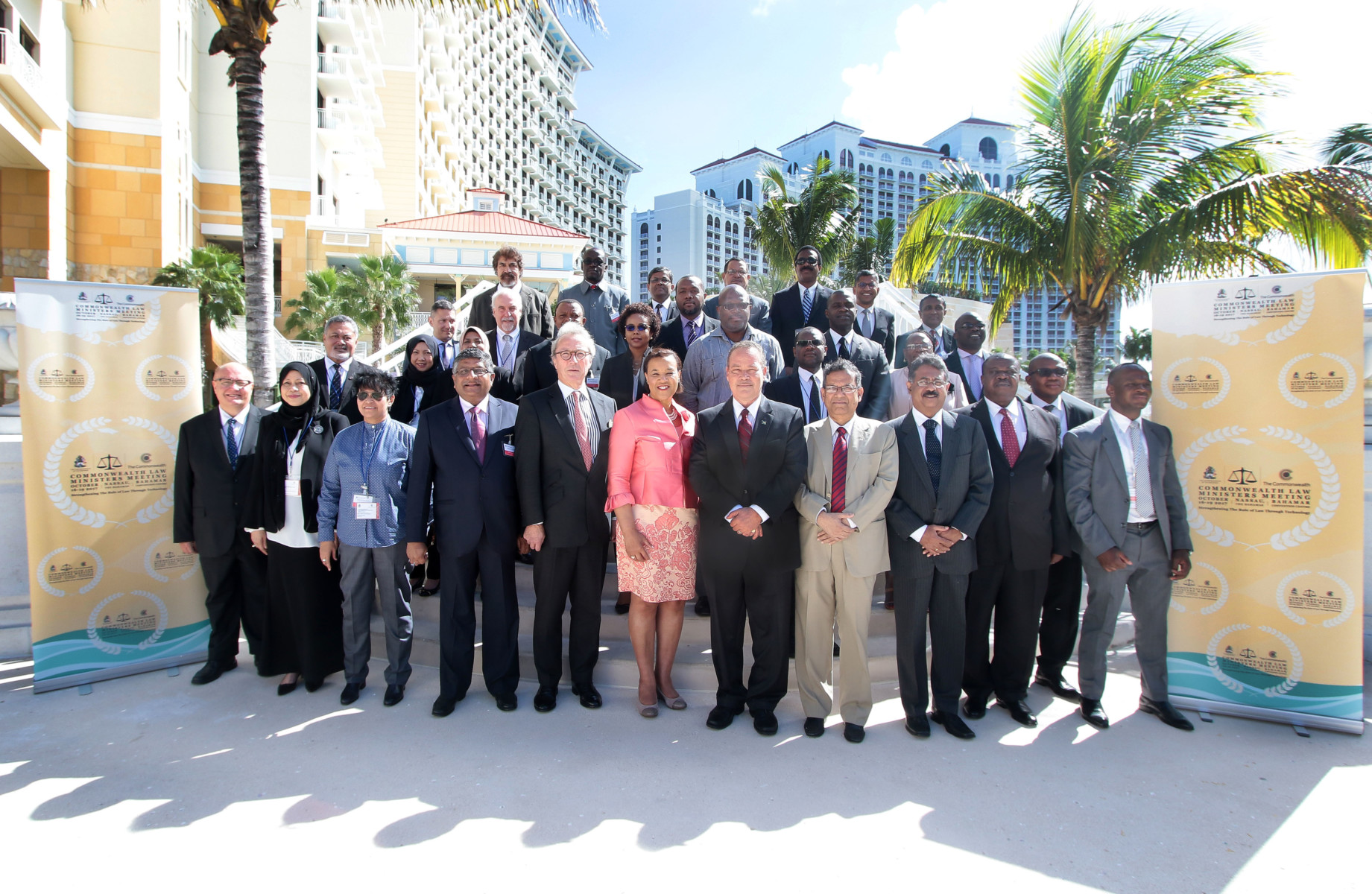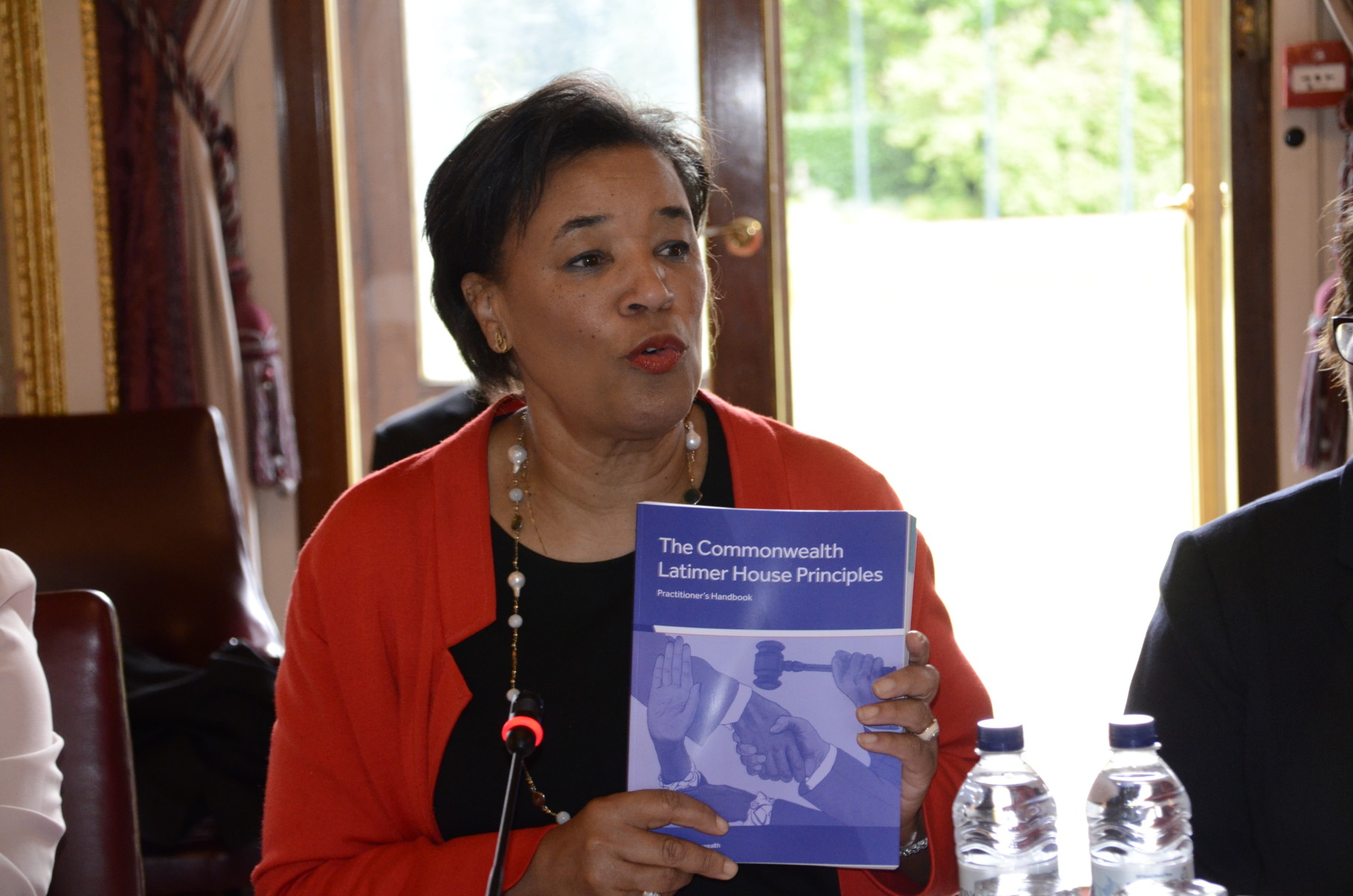“This is an occasion to share the best practices, the smaller countries, the big countries. In that way this interaction is very, very meaningful, “ said Ravi Shankar Prasad, Minister of Law and Justice and Electronics and Information Technology in India.
“The issues that have been taken up in this conference are very pertinent to us and it is important that we come here,” said Anisul Huq, Minister for Law, Justice and Parliamentary Affairs in Bangladesh.
The two ministers were speaking about the Commonwealth Law Ministers Meeting.
October 2017 was a productive time in The Bahamas. Attorneys-general, law ministers and senior law officials from around the world gathered there at the Commonwealth Law Ministers Meeting.
Our host was attorney-general of The Bahamas, Carl Bethel. He praised the Commonwealth Secretariat for strong initiatives to promote and protect justice. And he welcomed the recently launched Commonwealth Office for Civil and Criminal Justice Reform (OCCJR).
Very simply, the OCCJR provides technical assistance and an online platform with best practice guides. The platform includes model laws, standards, templates and legal insights on climate change, human rights and a range of other issues.
The meeting’s agenda was wide ranging – from tackling terrorism and addressing climate change, to eradicating early and forced marriage.
After three days of deliberations, ministers pledged to pursue key law reforms in a number of areas.
Watch: Highlights from the Commonwealth Law Ministers Meeting, October 2017 in Nassau, The Bahamas
Tackling terrorism
Delegates agreed to review and strengthen legal frameworks and legislation. They made a commitment to help prevent the grooming and recruitment of terrorists and to stop them crossing borders and being funded. They discussed how to make this aspiration a reality and recognised the importance of community involvement.
Action on climate change
Delegates also focused on law reforms to help their countries achieve targets to lower global temperatures. They agreed to support the smooth operation of relief efforts during and after natural disasters.
New legal frameworks are needed to improve health, education, employment, financial and other critical services relevant to the achievement of the Sustainable Development Goals.
Delegates discussed how they will work, as legal advisers to government, to develop those frameworks.
Facilitating reform
“There were many aspirations expressed at this meeting and to ensure that we are able to turn them into action, the Secretariat offered ministers a number of tools and support mechanisms,” said Secretary-General Patricia Scotland.
“Our new legislative drafting manual and guide to law reform will take legal drafters and those responsible for law reform through a step by step, stage by stage guide to create or amend laws in any of the areas discussed. These are going to help all our countries, but will be particularly valuable to developing and smaller countries with limited resources.”
She continued, “The theme of the meeting was Strengthening the Rule of Law through Technology, so we offered all ministers access to our Office of Civil and Criminal Justice Reform, which provides technical assistance and an online platform with best practice guides, model laws, standards, templates and legal insight on a range of issues.”
The Secretariat also presented a new secure messaging mobile app which will be trialled in 2018. This app will enhance international co-operation by helping countries to collaborate to tackle cross-border and organised crime.
Further progress in 2015-2017
Highlights:
- The Secretariat launched the OCCJR (mentioned above).
- Mauritius developed a new education law and a Police and Criminal Justice Reform Bill with Secretariat assistance.
- Nigeria: the government adopted guidance notes on the use of non-conviction-based forfeiture. It also published them for the judiciary.
- Swaziland: terror laws were reformed to conform with anti-terror legislation.
- We completed Commonwealth Fund for Technical Co-operation (CFTC) technical assistance projects to strengthen judicial capacity in three countries: Kiribati, Seychelles and Vanuatu.
- Our support to Kiribati’s High Court saw its civil and criminal case backlog reduce by 581 cases. There was also measurable improvement in the court’s efficiency through the adoption of new operational practices.
- We completed legislative drafting CFTC support in three countries: Fiji, Namibia and Belize.
In Fiji we assisted the Attorney-General’s Chambers in the drafting and passage of six amendment bills. Many of these relate to Fiji’s core economic and social sectors and will be critical to sustainable development in the country.
In Namibia, a short-term CFTC expert completed the draft Public and Accountants and Auditors Bill. This will help Namibia to better regulate its public accountants and auditors. In this way, the government can protect the financial interests of the Namibian public and international investors in accordance with internationally recognised standards and processes
In Belize, we supported the Attorney-General’s office by providing a senior legislative drafter. Between 2015 and 2017, this expert helped improve drafting systems and processes, strengthen the capacity of the office significantly, and reduce the legislation backlog. From a position of 73 outstanding pieces of legislation for drafting in April 2014, 67 acts have been passed by parliament. The host government expressed a high level of gratitude for the advice and guidance provided, and has since retained the expert beyond the project.
In 2015/16, we supported nine countries with targeted technical assistance for national legal reform – Barbados, Botswana, Guyana, Mauritius, Nigeria, Seychelles, Swaziland, Uganda and Vanuatu – making use of Commonwealth rule of law guidelines.
Highlights:
- Swaziland used Secretariat tools and model laws on issues of broadcasting laws.
- Seychelles, Botswana and Nigeria reformed legislation relating to cybercrime.
- Barbados commenced processes to reform cybercrime and cybersecurity law and policy.
- Nigeria, Mauritius and Uganda adopted and utilised the Commonwealth common law provisions on anti money laundering and countering financing of terrorism (AML/CFT).
- Vanuatu received support in a follow-up to political dialogue facilitated by the Secretariat. Political leaders explored constitutional and legal changes aimed at strengthening political stability in the country. Options for draft legal and constitutional amendments are currently being considered, some of which would require approval by referendum.
- Five countries – Fiji, Guyana, Namibia, Seychelles and Vanuatu – created legal frameworks for the delivery of justice and the promotion of reforms conducive to sustainable development. This included Namibia’s reforms to public accountants’ legislation.
- We supported members with administrating justice advanced through the establishment of independent national prosecutions offices.
- We provided Prosecutors’ Guidelines in Samoa to ensure the quick dispensation of justice.
- We developed the Legal Knowledge Management Portal (launched in 2017) for government officials to access laws of Commonwealth countries and exchange information on technical assistance projects.
- We introduced the development of a secure blockchain-based identity management and messaging app for the Commonwealth Network of Criminal Justice Contact Persons. It will improve the reliability of communication among key stakeholders.
- We established collaborative platforms in East Africa, the Caribbean and the Pacific for justice officials to exchange information and provide assistance to one another. This helps with the investigation and prosecution of transnational crime such as cybercrime.
Delegates] made a commitment to help prevent the grooming and recruitment of terrorists and to stop them crossing borders and being funded.
More progress on cybercrime and virtual currencies
Advancing our cybercrime and virtual currencies work has been a priority since CHOGM 2013. There, our Heads of Government highlighted cybercrime as a major obstacle to combatting the financing of terrorism and money laundering.
In 2015/16 the Secretariat headed the Commonwealth Virtual Currencies Working Group, which included representatives from seven members: Australia, Barbados, Kenya, Nigeria, Singapore, Tonga and the UK. We worked in partnership with the International Monetary Fund (IMF), the World Bank and the United Nations Office on Drugs and Crime (UNODC), with the US Federal Bureau of Investigation (FBI) as observers. Together we developed a set of recommendations urging the adoption of clear regulatory approaches to virtual currencies. This was to inform technical guidance to members on effective legislative, regulatory and criminal justice responses to virtual currencies.
Preventing violence against women and girls
The Secretariat’s work on violence against women and girls made significant progress through the production of the first ever judicial bench book for East Africa.


